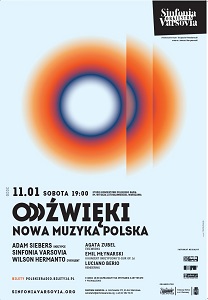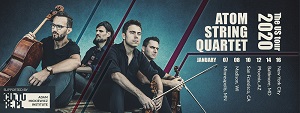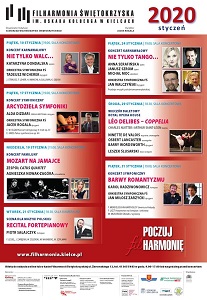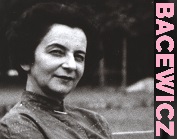
The next edition of the Sinfonia Varsovia series „Resounds. New Polish Music” will open with a concert on 11 January 2010 at 7.00 p.m. in the Witold Lutosławski Polish Radio Concert Studio in Warsaw. The programme will include compositions by Agata Zubel, Emil Młynarski and Luciano Berio. Adam Siebers will perform as a soloist, the orchestra will be conducted by Wilson Hermanto.
Fireworks (2018) by Agata Zubel is the composer's musical view on the hundred years of the Polish nation – its tradition and contexts of broadly understood culture. The eight-minute work for extended symphony orchestra is filled with fireworks of musical thoughts, impressions and sound reminiscences, freely combined with each other. The composition reached international audiences, arousing widespread admiration. It was performed, among others at London's Royal Albert Hall as part of the BBC Proms festival and Konzerthaus in Berlin. In August 2018, Fireworks brought Agata Zubel the European Composer Award.
The pretext for a musical retrospective to the interwar period is the 100th anniversary of the premiere of the Second Violin Concerto in D major by an outstanding violinist, conductor, composer and organizer of Warsaw's musical life – Emil Młynarski. The work will allow to observe the changes in the composer's language of expression over the century and understand the context of the new Polish music. Set in the tradition of European music, with a virtuoso solo party compared to Wieniawski's concerts, it will be performed by the outstanding violinist of the young generation, the second concert master of Sinfonia Varsovia, Adam Siebers.
The programme will also include Rendering (1989) by Italian composer Luciano Berio. Its genesis is associated with the discovery of sketches of the unfinished 10th Symphony in D major by Franz Schubert, which form the foundation of the composition. The premiere performance of the work took place exactly 30 years ago at the Concertgebouw in Amsterdam.
The concert will be preceded by a meeting with Agata Zubel led by Jacek Hawryluk (6.00 p.m.).
Media patronage: Polish Music Information Centre POLMIC.
More information at: www.sinfoniavarsovia.org









 Polska Orkiestra Sinfonia Iuventus im. Jerzego Semkowa ogłasza przesłuchania dla muzyków do 30 roku życia na stanowiska „Wiolonczele tutti” i „Kontrabasy tutti”. Termin przesłuchania: 13 lutego 2020 roku. Przesłuchania odbędą się w stolicy, w Studiu Koncertowym Polskiego Radia im. Witolda Lutosławskiego, Studio S3.
Polska Orkiestra Sinfonia Iuventus im. Jerzego Semkowa ogłasza przesłuchania dla muzyków do 30 roku życia na stanowiska „Wiolonczele tutti” i „Kontrabasy tutti”. Termin przesłuchania: 13 lutego 2020 roku. Przesłuchania odbędą się w stolicy, w Studiu Koncertowym Polskiego Radia im. Witolda Lutosławskiego, Studio S3.

 Filharmonia im. M. Karłowicza w Szczecinie ogłasza przesłuchanie na kontrabas – głos tutti (umowa o pracę, cały etat). Przesłuchanie odbędzie się 25 lutego 2020 roku o godz. 14.00 w Sali kameralnej Filharmonii Szczecińskiej. Termin złożenia dokumentów: do dnia 10 lutego 2020.
Filharmonia im. M. Karłowicza w Szczecinie ogłasza przesłuchanie na kontrabas – głos tutti (umowa o pracę, cały etat). Przesłuchanie odbędzie się 25 lutego 2020 roku o godz. 14.00 w Sali kameralnej Filharmonii Szczecińskiej. Termin złożenia dokumentów: do dnia 10 lutego 2020.



















